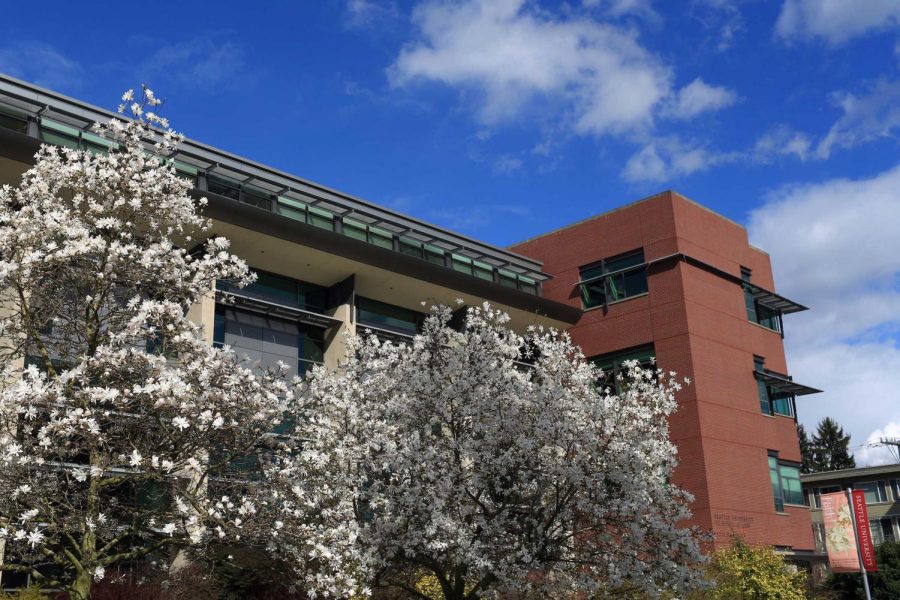Update: Law School Responds to Student Allegations Against Professor
On Jan. 18, The Spectator published a feature in which three anonymous sources alleged discriminatory treatment by visiting professor Bernard Burk. Since then, more sources have come forward to offer their alleged personal experiences of bias, as well as disagreements with the way sources characterized Burk in the initial article, which will be detailed in future coverage.
On Jan. 23, Dean Anthony Varona sent an email to all law students, faculty and staff responding to the article.
“Our Office of Academic Affairs worked directly with Professor Burk throughout the fall semester to address and resolve various students’ concerns. In addition, in late October the University’s Campus Climate Incident Reporting & Response Team received various reports from students in the course,” Varona wrote.
While Varona acknowledged that there have been numerous complaints made against Burk, he asserted that the law school had not been made aware of some concerns raised by the anonymous students in the article.
“Some of the most serious allegations reported by [The] Spectator, however, had not been shared with us at all during the fall semester,” Varona wrote.
In a Jan. 25 article published by Law.com, Burk offered a response to the allegations made by the anonymous students.
“Of course the anonymous allegations quoted in The Seattle Spectator claiming that I said specific objectionable things in class are false,” Burk wrote to Law.com.
As noted in the article, Burk has changed universities five times since August 2015, each time remaining at his new school for a visiting professorship of one contracted year. In addition, the article highlights a change which occurred on Burk’s “Rate My Professor” (RMP) page, Jan. 19.
“On Jan. 19, a comment from a student, posted to RMP in November, called Burk out as being ‘racist’—that comment no longer appears in Burk’s profile on the site on Tuesday,” the Law.com article states.
An anonymous group of students contest Varona’s claims that the concerns mentioned in the article had not been made clear to them during the semester. In a transcript provided by anonymous students of a Nov. 2 meeting with Vice Dean for Academic Affairs Andrew Siegel, a student tells him about concerns with the way that Burk discussed Native American students. When asked whether he was told about incendiary comments regarding Native Americans in Burk’s class, Siegel emphasized his previous work with concerned students.
“As Dean Varona has said in his updates to the community, we did receive concerns from students about Professor Burk’s teaching approach and some of his in-class statements, including at several long meetings specifically scheduled to dialogue with the students about their concerns. The concerns the students expressed were addressed directly with the professor and through the Office of Institutional Equity as appropriate,” Siegel wrote in an email to The Spectator.
In a Jan. 25 statement, Varona announced that an internal audit had been conducted of the Zoom recordings of Professor Burk’s class.
“The inquiry concluded that the alleged statements were nowhere in the reviewed recordings or transcripts. Professor Burk neither called Native Americans ‘savages’ nor ‘Brown students…terrorists,’” Varona wrote.
The anonymous source has confirmed that they stand by the relevant quotation as reported. In an email exchange with Siegel, The Spectator requested access to the recordings in order to corroborate or disprove the allegations of the anonymous sources independently.
“The privacy rights of faculty and students (including those delineated in FERPA) do not allow us to make classroom recordings available to the public. As noted by Dean Varona, the Office of Institutional Equity reviewed those class recordings that were relevant to the two most serious allegations in your Jan. 18th story. Both videos and transcripts were reviewed,” Siegel said.
Given that recordings of the class are not available to the public or media, The Spectator cannot independently corroborate or disprove the allegations of the anonymous sources in the initial article. As it currently stands, Seattle U has only offered an assessment of Burk’s behavior based on the review of another office internal to the university itself.
The Seattle U Black Law Student Association and the OutLaws, Seattle U’s LGBTQ+ law student group, both released statements of solidarity in response to The Spectator’s article, Jan. 20.
“We stand with our minority student communities and with students everywhere who continue to demand positive change in the face of bigotry,” the OutLaws’ statement reads.
In addition, SU Ain’t For You, a student group advocating for students with disabilities and an end to Seattle U Law’s longstanding practice of offering conditional scholarships, offered support to the students who reported on the allegations of discrimination.
No communication from the administration directly to The Spectator has included a denial of the students’ allegations that Burk, among other claims, treated gender minorities in an unequal manner, used transphobic language, did not give adequate accommodations to students with school-recognized disabilities and failed to recognize students of color in a classroom awards system before being prompted.
In the statement issued by Varona in the late morning of Jan. 25 (which is published as a Letter to the Editor in The Spectator) the dean acknowledged the need for reconciliation with some first-year law students.
“We wholeheartedly acknowledge that we need to undertake restorative work with our 1L class to address the additional concerns expressed by our community members, in [The] Spectator and elsewhere,” Varona wrote.
The Spectator is pursuing follow-up coverage, and will continue to pursue a diversity of sources in regards to the controversy at hand.











